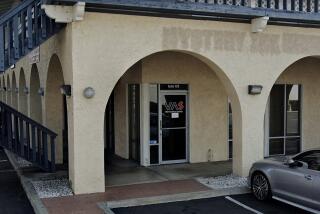Hill Williams Chief Deflects Creditors’ Questions : Real estate: Donald Williams, who has been accused of operating a Ponzi scheme, repeatedly sidesteps inquiries during bankruptcy proceeding.
- Share via
SANTA ANA — Donald H. Williams, who has made himself scarce for the past few months, appeared at a bankruptcy proceeding Monday to answer questions fired at him by creditors of his real estate development company.
But even in person, Williams maintained an elusive air, saying again and again that he either didn’t know or couldn’t remember specifics of various financial transactions. Repeatedly, Williams deflected inquiries to other Hill Williams Development Corp. officers--most frequently, Charles R. Rountree, who had been the company’s controller.
“It sounds as though Charles Rountree knows more about your company than you do,” said a frustrated William Burd, attorney for the court-appointed trustee overseeing the company’s estate.
From 1989 through the end of last year, Hill Williams Development raised $90 million from about 5,000 investors, allegedly to build homes. The company, based in Anaheim Hills, promised investors a 15% annual rate of return on their money. Their dividends were paid with monthly checks.
In February, however, the California Department of Corporations accused company President Williams of operating a Ponzi scheme in which little investor money actually went toward buying and developing land. The department, the U.S. Postal Inspection Service and the Orange County district attorney’s office are conducting a joint investigation.
Hill Williams and its four fund-raising partnerships filed for liquidation earlier this year under Chapter 7 of the U.S. Bankruptcy Code. Since then, bankruptcy trustees have been sifting through the company’s ledgers in an attempt to trace the money owed to investors and other creditors.
While it was raising money from the public, Hill Williams bought about two dozen properties, most of them in San Bernardino and Riverside counties. Typically, the company borrowed from an institutional lender for a property’s first deed of trust. Then it attached a second trust deed--well beyond the property’s value--under the name of one of the partnerships.
For example, in its bankruptcy filing, Hill Williams lists the value of a would-be housing development in Anaheim Hills as $1.6 million to $2.5 million. The company borrowed $2.7 million from Great Western Bank to purchase the property, then took out a $4.3-million loan against the project from one of the fund-raising partnerships.
“Did Hill Williams ever make money other than to receive it from investors’ income?” Ronald Rus, attorney to the trustee for the partnerships’ estate, bluntly asked Williams.
Williams said that the company, founded in 1985, had sales every year. However, he said he couldn’t recall exact sales figures during the three years that Hill Williams raised public funds.
Attorneys also quizzed Williams about unsecured loans granted by the company to his family members. One of his sisters, Victoria Williams, received $152,000 to start a floral shop, as well as a $52,000 personal loan. The shop is not in operation, Williams said at the hearing.
A few creditors took turns at the podium. One of them, Jerry Floyd of Huntington Beach, said he leased Williams 150 acres of land near Corona. Williams then used the property--which he didn’t own--to secure a loan from investors, Floyd alleged.
Only a handful of investors showed up at the hearing, held in the Santa Ana City Council chambers. More investors are expected at the meeting of the partnerships’ creditors today. “I’m surprised there aren’t more people here,” remarked investor Felicia Bukaty, a Fullerton travel agent. “I thought a couple of hundred investors would come to throw spitballs at Don Williams.”
More to Read
Inside the business of entertainment
The Wide Shot brings you news, analysis and insights on everything from streaming wars to production — and what it all means for the future.
You may occasionally receive promotional content from the Los Angeles Times.









